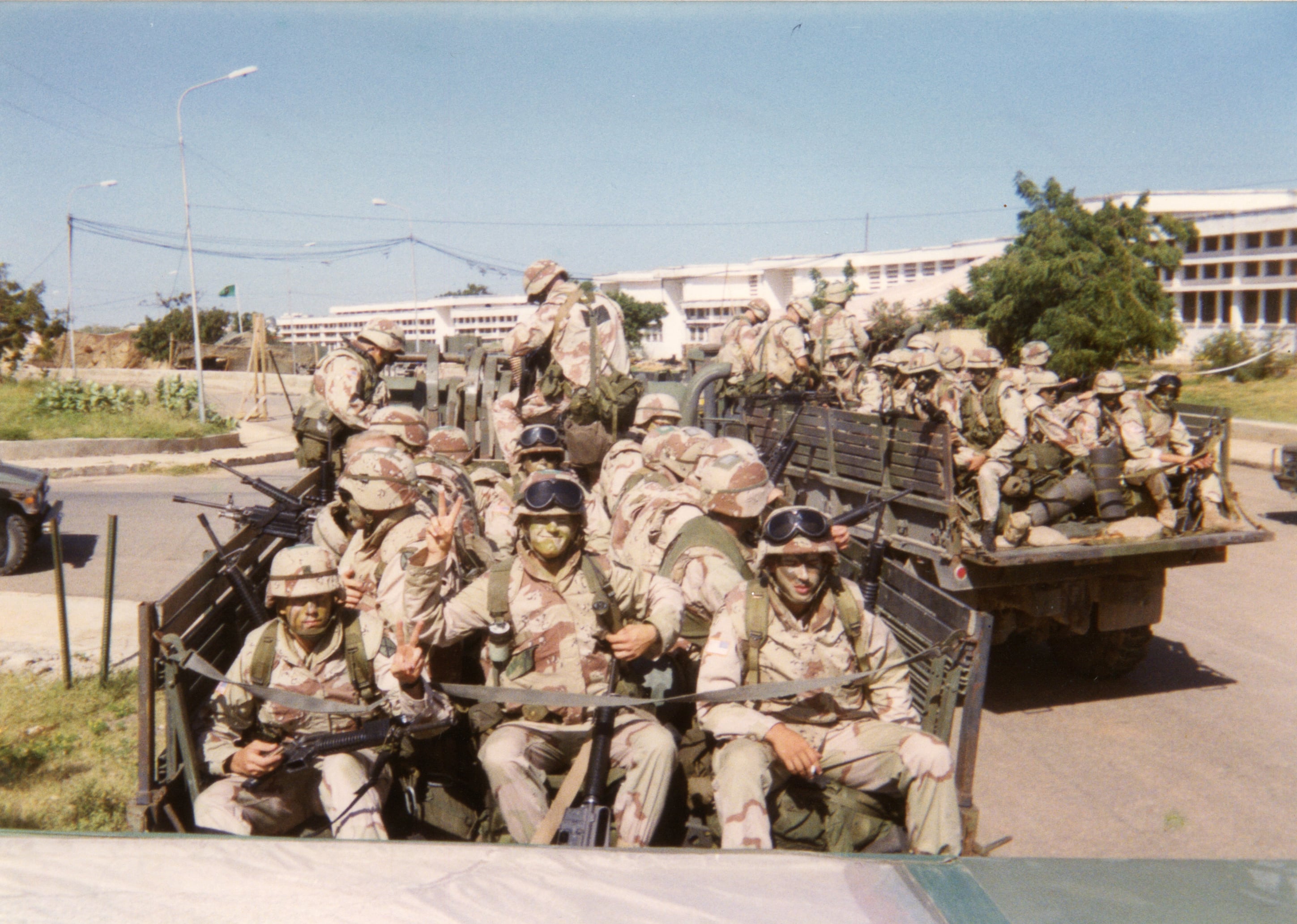On the 29th anniversary of the 1993 Battle of Mogadishu, an Army company that has so far been absent from the official history of that harrowing gunfight has finally been recognized.
On Sept. 30, members of 10th Mountain Division at Fort Drum, New York, held their annual “Mogadishu Mile” ruck run.
The run commemorates the Oct. 3-4, 1993, battle that ensued after a raid by Delta Force and Army Rangers that saw two Black Hawk helicopters shot down and ultimately 19 U.S. soldiers killed and 73 wounded.
Multiple units supported the operation, and some, such as 2nd Battalion, 14th Infantry Regiment, were featured in the book and film, “Black Hawk Down.” A subsequent documentary, released in 2019, highlighted the contributions of 2-14.
The “mile” honors the final stretch of the battle, when a group of Rangers and Delta Force operators had to run on foot out of the city, using armored personnel carriers as cover because the vehicles were full, or their United Nations-assigned drivers would not allow more soldiers inside.
But another unit, one attached to 2-14 shortly before deployment, has gone unrecognized for nearly 30 years.
Members of Charlie Company, 1st Battalion, 87th Infantry Regiment, responded and fought sniper-filled routes to help rescue the Americans trapped inside Mogadishu. That same company had responded earlier in the mission, when another Black Hawk was shot down a week before on September 25.
The first known official mention, a single sentence description, of their contribution came during a short historical narrative shared at the 10th Mountain’s “Division Live” combat demonstration on Aug. 31, 2022, at Fort Drum, said Division spokesman Lt. Col. Josh Jacques.

It is a small mention, but it’s the start of what could become much more. Staff for 10th Mountain Division submitted review requests to recognize and honor Charlie Company soldiers through the Department of the Army.
Though they endured multiple combat engagements on the tour, they received no valor awards or decorations.
Because they were attached to 2-14, the soldiers simply returned to Fort Drum after the deployment and went on with regular training. Most of the soldiers left the Army after their enlistments ended, veterans of the unit told Army Times.
Tom Mooney served as platoon sergeant on that deployment. His unit was the quick reaction force and saw its first major firefight when a Black Hawk was shot down in late September, before the infamous October 3 battle.
“If we were not there, there would have been a hell of a lot more casualties and there would have been people left behind,” Mooney said.
In 2021, Congress authorized award upgrades to the Distinguished Service Cross for four soldiers who served in the Mogadishu battle, Army Times reported. Earlier that year, the Army upgraded 58 previous awards to the Silver Star.
Each time an anniversary of the battle hits or news breaks of award upgrades or additional recognition for other units in the fight, those become reminders for what his soldiers didn’t get — any acknowledgment of their contribution.
“That would mean a lot, not necessarily for me but to my family and the soldiers I served with,” Mooney said.

Col. Brian Ducote is the current commander of 1st Brigade Combat Team, 10th Mountain Division, whose lineage traces directly to 1-87, is deployed to Iraq.
The colonel started his Army career in 1995 as a cadet at the U.S. Military Academy at West Point, two years after the battle had concluded. He knew the history of the battle and 10th Mountain Division’s contribution to the mission before he arrived at Fort Drum.
“But I had never been told the personal stories from our former service members until recently,” Ducote told Army Times in an email response. “I remember thinking to myself that we have to honor the legacy of all soldiers who were involved and capture their efforts in our own history.”
It was about a year ago, when speaking to a Charlie Company veteran, that Ducote learned of that vein of history within the division.
“I was captivated by this veteran’s stories of the honor, courage and resolved demonstrated by those 1-87 soldiers,” Ducote wrote. “I’m humbled by the fact that I see the same character and attributes in our soldiers who serve in our unit today.”
After decades of being left out of the battle’s narrative, Ducote said that recognizing the 1-87 soldiers shows those in the division today that the unit takes pride in remembering and recognizing its history, as well as “the soldiers that sacrificed for it.”
“It is important to know the history of the unit you serve with, it’s important to remember those who have come before, and it’s important for soldiers to understand how soldiers can shape an organization,” Ducote said.
Todd South has written about crime, courts, government and the military for multiple publications since 2004 and was named a 2014 Pulitzer finalist for a co-written project on witness intimidation. Todd is a Marine veteran of the Iraq War.





